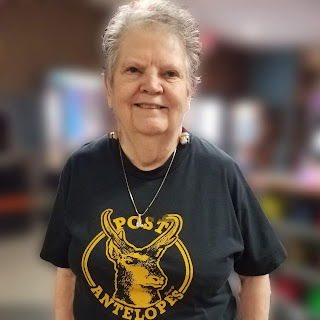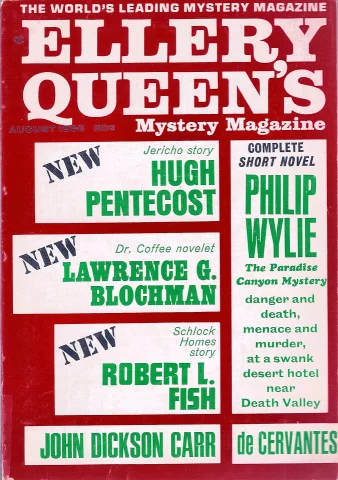 |
| Photo by Michael Fowles |
As I mentioned in an earlier column, October 2019 was a special month
for me. Not only is it my
fortieth anniversary as a published writer
but - by coincidence - the Northwest Chapter of the Mystery Writers of
America asked me to be the speaker at their meeting. They suggested I
review highlights of my career but that sounded boring even to me. I
countered with the title above, which gave me a chance to do such a
review but make it of possible interest to my fellow readers. So now I am going to summarize the words of alleged wisdom I
shared with those who attended.
1. Editors don't reject you. They reject words you have written. So don't take it personally, and try again. I was rejected by
Ellery Queen Mystery Magazine 76 times before they bought a story.
2.
When in doubt, don't throw it out. If a story doesn't sell does it
mean that it stinks? No, it means that on a given day it didn't meet
that market's needs. Really. So tuck it away and see what happens.
I
wrote a story about a TV actor who kills a rival. All my favorite
magazines rejected it. Years later the Mystery Writers of America
announced an anthology to be titled
Show Business is Murder. "On The
Bubble" found a happy home.
3. Flattery and bribery are good for
you. I don't mean that you should apply them to your editors, reviewers, or even readers. I am talking
about the Miner, which is what I call the part of the brain that comes
up with story ideas. (The other creative part of your brain is the
Jeweler, which turns the raw material into something pretty and
publishable. When an author says "I don't even remember writing it!"
that means the Miner did ninety percent of the work.
Most people have trained the Miner to be lazy. How do you that? By ignoring
the ideas he offers you. You can flatter him by taking those ideas
seriously. Even if you don't have time to start that novel today, write
down the concept. Spend five minutes brainstorming the idea. Don't in
short, look a gift horse in the mouth.
And how do you bribe the
miner? Spend money on him! Buy a writing text, get that new desk
chair, go to a writing conference. Convince him that you are taking
your writing career (yes, let's use that word) seriously. Who knows?
Maybe you'll convince the rest of your brain as well.
(Interesting example: I gave this talk on Saturday. Monday morning I woke up with two new ideas for short stories. The Miner obviously liked the attention.)
4. It's
okay to plagiarize. Sometimes. I'm talking about what Lawrence Block
called "Creative plagiarism." That's when you take someone else's idea
and use it differently.
Many years ago Fletcher Flora wrote a short story called "The Seasons Come, The Seasons Go." It appeared in
Ellery Queen in 1966. The plot involved a wealthy man, his useless nephew (who narrated), an attractive young woman, and a plot to kill someone in the family.
The first story I ever sold to
Alfred Hitchcock was originally called "My Life as a Ghost," but they changed it to "The Dear Departed." (The only time one of my stories was retitled, so far.) My story involved a wealthy man, his useless nephew (who narrated), an attractive young woman, and a plot to kill a family member. It also featured a similar twist ending.
Stop thief, I hear you cry. But the truth is, my version is completely legitimate. The murder and motive are quite different, and my victim is a person with no parallel in the original. If you read the two in quick succession you would probably have a suspicion about how the second story would end, but that happens all the time. There are only so many possible endings.
5. Self-publishing doesn't work. Unless it does. Since no one seemed to be clamoring to publish a collection of my short stories I did it myself.
Shanks on Crime includes 13 stories about mystery writer Leopold Longshanks, most of which had already appeared in
Alfred Hitchcock Mystery Magazine. I hired a professional book designer and produced it both as a paperback and an ebook.
How did I do? I lost a couple of hundred bucks on the deal. Nothing that would keep me from buying dinner or make me lose sleep, so I was fine with it.
Then I received an email from a literary agent asking if I would like to sell the Japanese rights to Tokyo Sogen, the oldest mystery publisher in that country. I said, why sure. The amount they paid me would be less than a rounding error for, say, James Patterson, but it is the most money I have ever made on a piece of writing. And they were so happy with sales that they just published a collection of some of my otherwise uncollected stories later this year.
Would any of that have happened if I hadn't bit the bullet and self-published my book? Nope.
6. Mash-ups are delicious. In computing a mash-up is an app that combines data or functions from two sources. Classic example: you create a Google map using the addresses in a database of customers.
When I refer to a mash-up I mean taking several different sources to create something new. For example, I have published six stories about Uncle Victor. These stories are a mash-up of
The Godfather, I, Claudius, and Jack Ritchie's Henry Turnbuckle stories. Uncle Victor is the eccentric relative of a mob boss. Like Claudius, he survives in a deadly family because no one takes him seriously enough to kill him. And his major asset as a private eye is the one he shares with police detective Henry Turnbuckle: self-confidence that is completely unjustified by reality.
Another example is my story "Brutal," which appeared in
Alfred Hitchcock. It combines Jim Thompson's
The Getaway - about a robbery that goes perfectly, followed by a disastrous attempt to escape - with Neil Simon's movie
The Out-of-Towners. My story is about an assassin who completes his job perfectly and then is crushed by a series of average city-dwellers who are just carrying on with their lives, completely unaware of who they are dealing with.
7. Be nice to your editors and they may be nice to you. Obviously good manners are important. I am sure most editors have a list (at least in their heads) of writers who are Too Much Trouble To Deal With. But I want to give a specific example.
A few years ago I wrote a story which looked at the very first mystery, Edgar Allan Poe's "Murders in the Rue Morgue" from the viewpoint of the murderer (that's right; the orang-outang). I sent it to a magazine with which I had an excellent relationship. And then I saw a notice for an anthology of Poe-related stories. A perfect market for my tale! I didn't want to withdraw my already submitted story and risk the relationship with an on-going customer. So I wrote to the editor I had already submitted to and explained my plight. I said I would be delighted to have my tale in their publication, but would it be possible t jump the queue and get an early decision so if they don't want it I could try the anthology?
And the editor went above and beyond by pulling my story out of the long stack and giving it a quick read. Turns out they didn't want it, which was fine. I submitted it to
nEvermore! and not only was it accepted but it was reprinted in two best-of-the-year collections. But this was only possible because the editor was willing to do me a favor by giving me a special read.
8. One-market stories are dangerous temptations. Ideally you want to write a story that could find a happy home in many different locations. But sometimes an opportunity comes up for a niche market, usually an anthology. Whether that's a good idea depends on a number of factors including: the speed you can write, the possible reward, and how intriguing you find the concept. After George W. Bush was elected someone announced an anthology called
Jigsaw Nation, in which all the stories would take place in the United States after the blue and red states separated.
I thought it was a great concept and wrote "Down In The Corridor," about the consul from the Pacific States of America dealing with a nasty situation in the San Diego Corridor which connected the greatly diminished USA to the ocean. It was a crime story (my specialty) as well as a science fiction (or alternative almost-history) story. It sold to
Jigsaw Nation which was great but the book was pretty much ignored by the world. Ah well.
A few years ago several cartoonists created an anthology called
Machine of Death, with an intriguing concept. You put a drop of your blood in this machine and it tells you how you will die. Not when; just how.
Car crash. Gunshot. Mary. Yeah, but which Mary? Your wife Mary or Hurricane Mary? Like all good oracles the machine is wickedly ambiguous.
Suicide could mean that somebody jumps out a window and lands on you.
I loved the concept so much I wrote two stories for it: a historical and a police procedural. The editors rejected both. Those are two stories I can never use anywhere.
9. Network, network. Also: network. There are fine organizations out there looking for members: Mystery Writers of America, Sisters in Crime, International Thriller Writers, Private Eye Writers of America. There are conferences: Bouchercon, Left Coast Crime, Malice Domestic. And here is a shocking secret: a lot of mystery writers are friendlier than you might expect. They DON'T want to read your unpublished manuscript but they might be happy to hear what you liked about their latest masterpiece. And if you see a lonely author sitting alone at a signing table, go up and chat. It doesn't obligate you to buy anything. And don't forget to read SleuthSayers!
Well, that's nine jewels of wisdom down. In two weeks I will return to polish the last gem.













































